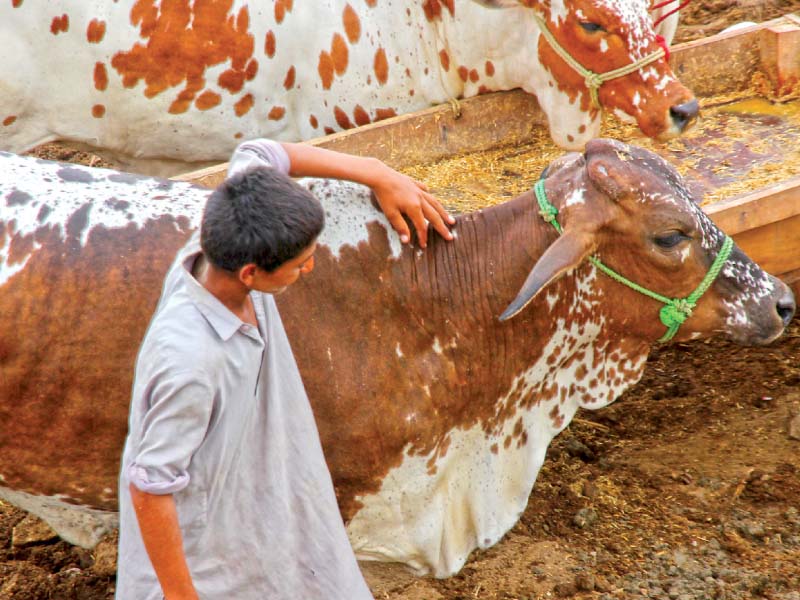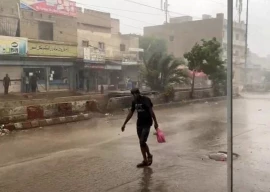
The transportation of animals from various districts of Sindh, Punjab and Balochistan to one of the largest cattle market in Asia that has been set up along the Superhighway began several weeks ago. Currently, 40,000 animals have reached the market and 150,000 large and 70,000 small sacrificial animals are expected to arrive within the next couple of weeks. Cattle owners and traders are unaware about their vulnerability to the disease and the threat posed to them and the population at large during Eidul Azha.
According to experts, cattle and animal handlers are the most vulnerable to the virus.
“Aaey Congo ki hunda aay [what is this Congo]?” asked cattle seller Ghulam Muhammad Sheikupuri who is residing in a temporary cattle market set up off the Superhighway. His casual, unconcerned question is indicative of the imminent threat to Karachi’s residents: no one knows what the virus is.
Sheikupuri said neither he nor any of his fellow cattle sellers had any vaccination certificates for their animals, nor did they need them. According to him, they are well-versed in the ways of animals and, despite being uneducated, know more than veterinarians when it comes to treatment of cattle.
Wahid Buksh, another owner from Jamal Din Wali near Rahim Yar Khan, said the government has not provided them with vaccines but even if it had, they would not trust them or their medicine. We inject medicine at our own expense, which costs us Rs5,000 for 20 cattle, he said.
A seller from Kashmore, Gareba Mazari, said they inject medicine to protect their animals from malaria and fever since the disease kills more of their animals than the Congo virus. “This is the first time I have heard about this disease,” he said, however, Mazari was very sure that their animals are free of ticks, despite never having been vaccinated or formally treated.
Muhammad Ansari from Liaqatabad came to the market to purchase cattle and was impatiently trying to negotiate for an animal for less than Rs120,000. “I’m least concerned about the virus, as long as I can get the sacrificial animal in the stipulated amount I will be pleased,” he said.
However, another concerned buyer from PECHS, Asif Sheikh, said, “We need to be careful in choosing animals for sacrifice on Eid, as our family was affected three or four years ago when we bought a tick-infected buffalo”.
Another seller, Bahar Khan Balkani from Rajanpur, Punjab, added that they prefer traditional methods, such as applying a diesel soaked cloth on a tick bite to prevent disease spread. He said they regularly inspect their animals.
Balkani claimed no one checked their animals while they were coming to Karachi, however everyone was interested in getting money from them along the way.
Vets on site
On the directives of Sindh governor Dr Ishratul Ebad on Thursday, a team of veterinarians and paramedical staff were stationed at the market by the Sindh livestock and animal husbandry department. However, the market was set up on August 7, almost two weeks ago.
The team comprises 17 veterinary officers and 16 paramedical staff and stock assistants.
Dr Madan Lal, speaking on behalf of the market’s doctors, said all the cattle herders had already vaccinated their animals before transporting them to Karachi. “Currently, we have been deputed to treat ailing animals or those injured during transportation animals,” he explained, saying no animal can be vaccinated at this point since the incubation period of the vaccine is 21 days.
Incurable disease : Prevention is the only cure: expert
According to assistant professor of the infection control committee, Aga Khan University Hospital, Dr Faisal Mahmood, the hospital’s laboratory has detected over 40 cases of the Congo virus since January this year. Talking about precautionary measures, Mahmood said the infected blood of cattle can affect human beings and suggested covering the face while culling the animal and especially protection of the eyes and mouth from the animal’s blood. He added that while coming in contact with cattle, people must wear full sleeves, light-coloured clothes so the ticks can be identified. Talking about the symptoms of the disease, he said it causes high grade fever with nose and gum bleeding as well as liver and kidney failure. A medicine to prevent the virus can be provided to people, however, if a person is infected with the virus he or she is incurable, he added.
Published in The Express Tribune, August 21st, 2016.














COMMENTS (1)
Comments are moderated and generally will be posted if they are on-topic and not abusive.
For more information, please see our Comments FAQ